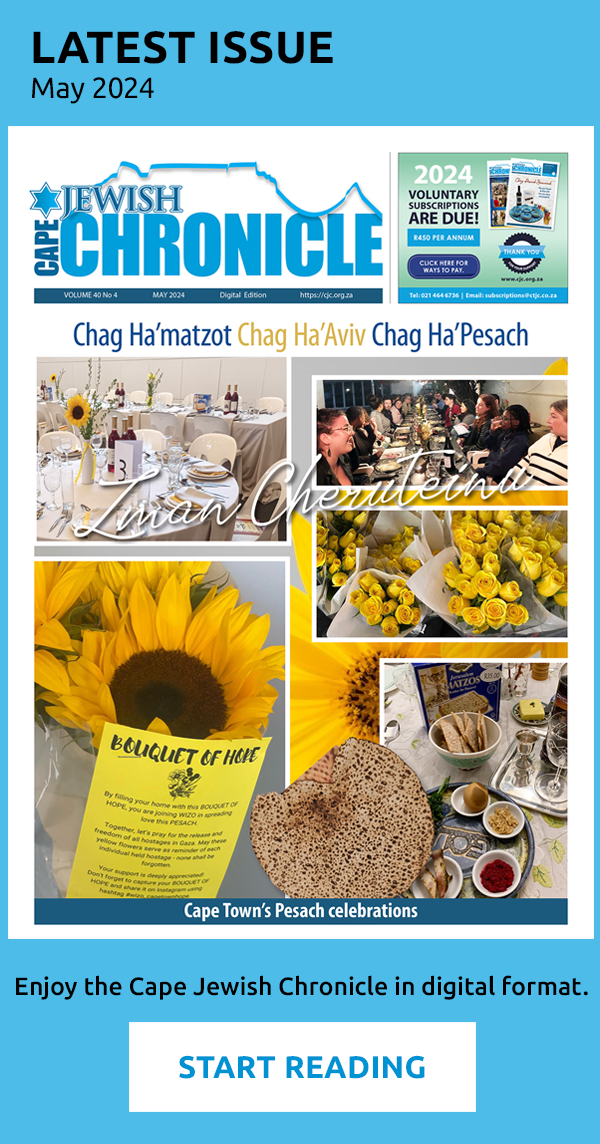For many South African Jews, that is rapidly becoming the question
By MANDY ALLEN
Aliyah is Hebrew for ‘ascent’, interpreted as the ‘act of going up’ towards the holy city of Jerusalem. Emigrating to Israel from the Diaspora – the act of making aliyah – is one of the touchstones of Zionism, representing the ultimate homecoming. Whether or not you choose to make aliyah in your lifetime, as a Jew it is both your legally enshrined right (the Law Of Return) as well as a rite of passage.
However, fulfilling the modern dream conceived of by Herzl – who was inspired by the Jewish land-soul connection that is as old as history itself – still comes with the headache of bureaucracy and paperwork. Being a practical people, we took care of that in the form of the annual Aliyah Expo, taking place in South Africa for almost two decades now.
The expo affords prospective Olim or the Olim-curious a chance to cover all the FAQs: documentation and eligibility; the ins and outs of the education system; employment, taxation and medical matters; how to establish a business. Seasoned ex-South African Olim who have (re)established their roots in Israel are also there to share their personal experiences.
This year’s expo took place in early April at Sea Point’s Marais Road Synagogue, with all the heightened security precautions necessary. At midday, a small group of anti-Israel protestors arrived, eventually numbering around twenty. While unwelcome, it was not unexpected and CSO kept disturbances to a minimum.
Unfortunately, what began as familiar rhetoric about colonial entities and genocide progressed to a small breakaway group vandalising several cars driving past (the incident is being investigated). The authorities arrived swiftly to diffuse the situation and, while nobody was physically hurt, it was an undeniable escalation from violent words to violent actions.
It must be pointed out, in the current zeitgeist, where incidents of global antisemitism are increasing at alarmingly exponential rates, the South African Jewish community – while not being spared of antisemitism – has been relatively fortunate with regards to the low percentage of real-life incidents compared to the experiences of other Jews in the Diaspora. The repeat patterns of antisemitism, however, are unmistakable and we ignore them at our peril.
Jews are not a monolith, of course, but taking the temperature on social media and in conversation reflects something that many South African Jews are experiencing to varying degrees – an unravelling of our sense of security and belonging in the country that we love. (Consider yourself lucky, and perhaps stop here, if you don’t relate.)
Who reading this hasn’t, in the last few months, questioned what our future and that of our children will look like here? South African Jews – a large percentage of us at least – have been shaken by our current government’s foreign policy: its vocal support for Hamas, its increasingly warm ties with totalitarian and authoritarian regimes, and its willingness to be choreographed straight into the chambers of the ICJ by the Islamic Republic of Iran. In pursuing these relationships, and a general unwillingness to acknowledge the concerns of the Jewish community, the pervading sense is that the ANC has thrown South African Jews under the bus, giving the green light to Jew hate. That there have not been any serious incidents here speaks to the decency and morality of the majority of South Africans, who are not represented by the behaviour and policies of the government. This is a beacon of hope. And we are not Jews with trembling knees. This is our home. Most of us aren’t going anywhere and nor would we want to.
The ultimate paradox here, of course, is that more uncertainty for Jews in the Diaspora results in higher aliyah figures. Something that those who are hellbent on the destruction of the State of Israel would do well to remember considering that, for them, one Jew in Israel is already one too many.
Our constitution provides for the right to freedom and security including the right ‘to be free from all forms of violence from either public or private sources’. Jewish citizens of South Africa, just like anyone else, also have the right of association – including being able to walk freely and without intimidation into a Jewish event, a Jewish-themed movie, and an aliyah expo… When those anti-Zionists stand outside these venues and reveal the true nature of their ideology, when they make Jews feel unsafe, they only strengthen the case for aliyah. It’s the ultimate own goal and the joke’s on them.
Even with the current war, olim are steadily arriving to make new lives in their ancestral homeland. It’s incorrect to frame aliyah purely as a response to Jewish persecution. We go to fulfil a longing. We go for job opportunities. We go for family connections. We go out of a sense of loyalty.
But aliyah is undeniably tied to political and societal shifts. And for many Jews right now, those shifts feel seismic. It is a source of comfort to know that Israel exists as the Jewish homeland to welcome and protect us. Never again means never again.
• Published in the May 2024 issue – Click here to start reading.
• To advertise in the Cape Jewish Chronicle and on this website – kindly contact Lynette Roodt on 021 464 6736 or email advertising@ctjc.co.za. For more information and advertising rate card click here.
• Sign up for our newsletter and never miss another issue.
• Please support the Cape Jewish Chronicle with a voluntary Subscription for 2024. For payment info click here.
• Visit our Portal to the Jewish Community to see a list of all the Jewish organisations in Cape Town with links to their websites.
Follow the Cape Jewish Chronicle: Facebook | Instagram | LinkedIn












